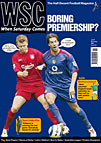 We're told it often enough, "the Premier League is the most exicting league in the world". But is it worth it?
We're told it often enough, "the Premier League is the most exicting league in the world". But is it worth it?
At any particular moment the state of mind of many football fans is a fusion of cynicism and stoic despair, an outlook (leavened, of course, with brief bouts of bonhomie and joie de vivre) that we try to reflect. It’s not always the dominant view in most sections of the media, concerned more with selling the game, and especially “the most exciting league in the world”, than with reporting on it. But every so often what might be seen as the WSC default position comes back into vogue.
This is one of those times, as has been abundantly clear in the press coverage of football in the past few weeks, which has been a litany of complaints: results are predictable, games are boring, tickets are too expensive. The sections of the media that actively dislike the game have contrasted cricketers with footballers, saying the latter are uncouth louts who don’t deserve their Lexus.
The Premier League is agitated enough to set up a working party to examine the causes of falling attendances and viewing figures. Chief executive Richard Scudamore concedes that television coverage has reached saturation point and suggests that, for the first time since Sky became the main financial backer of the game, the next deal, due to start in 2007, should not involve an overall increase in the numbers of games broadcast.
Meanwhile, certain managers have been mulling things over. Sir Alex Ferguson has weighed with a call for a ceiling on ticket prices and typically seized the chance to score a point, criticising London clubs, and one in particular, for putting up prices for matches involving high-profile visitors from the north-west: “If some grocer puts his pound of sugar up a penny more than the guy next door he will probably get fined £3,000 or even closed down.” A quaint view from the multimillionaire’s socialist past, a throwback to the era of price control.
Arsène Wenger is more exercised by the problem of boring football, suggesting that clubs have a moral duty to entertain. To this end he would like to see bonus points offered for goals scored. As with Sir Alex, one senses a hint of self-interest. Arsenal, at least when Thierry Henry is playing, seem better equipped than anyone to win matches by big margins, so a reward for extra goals could be a way of hauling back the dominant but cautious Chelsea.
That said, there is nothing wrong with defensive football if it involves one team intelligently countering an opponent’s style. Complaints about the preponderance of dull matches in the Premiership overlook the underlying reason why teams play as they do – it’s a by-product of the imbalance in a league where 80 per cent of clubs are either scrapping for a European place or just aiming to stay up. The gap between fourth and 18th is so small that it is possible to lurch very quickly from one target to the other, as Everton are discovering.
There is no escaping the fact that the big clubs have greatly damaged top-flight football, with the aid of Sky. The game at the highest level is stultifyingly predictable, because the top handful are directly rewarded three times over: for finishing high in the table, for appearing on television the most and then with guaranteed sums from the Champions League pot. That’s before you start on other sources of funding, whether from outside the game or from ordinary supporters’ pockets.
A handful of over-indulged clubs have become successful corporations that take every step possible to minimise the risk of defeat on the pitch, each of which brings with it a possible loss of revenue. The element of open competition vital to a healthily functioning sport has been gradually whittled away. Entertaining the spectators per se has never been a top priority for clubs. Indeed, ever since the professional league began, there have been debates about how to make the game more interesting – three points for a win came in precisely because of concerns about dull play and the decline in number of goals scored. But when football was at least cheap it didn’t matter as much if it was boring. Today, if someone is going to pay upwards of £40 they have not so much justification for expecting to be entertained as a need to receive something to match the outlay.
The evident flaws in modern football are being highlighted now because the reality doesn’t tally with the hype pumped out by Sky et al. Football is creaking under the weight of the importance attributed to it over the past ten years. It is, finally, in effect being asked to justify the amount of attention it has been receiving and it can’t hope to do so.
Football’s status as our most popular sport is not under threat. What is in danger is the hype. Danny Fullbrook of the Daily Star defended the game against recent criticism by calling it “the lifeblood of the country”. That doesn’t reflect love for the game, but mania that anyone who stops and thinks can see through. It’s time for football to embrace reality, rather than run away from it.
From WSC 225 November 2005. What was happening this month